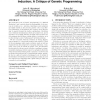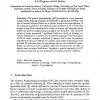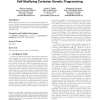640 search results - page 2 / 128 » Learning Programs in Different Paradigms using Genetic Progr... |
GECCO
2006
Springer
13 years 8 months ago
2006
Springer
Genetic Programming offers freedom in the definition of the cost function that is unparalleled among supervised learning algorithms. However, this freedom goes largely unexploited...
GECCO
2009
Springer
13 years 11 months ago
2009
Springer
We revisit the roots of Genetic Programming (i.e. Natural Evolution), and conclude that the mechanisms of the process of evolution (i.e. selection, inheritance and variation) are ...
EVOW
1994
Springer
13 years 9 months ago
1994
Springer
The genetic programming (GP) paradigm is a new approach to inductively forming programs that describe a particular problem. The use of natural selection based on a fitness ]unction...
EUROGP
2004
Springer
13 years 10 months ago
2004
Springer
In this paper, we use multi-objective techniques to compare different genetic programming systems, permitting our comparison to concentrate on the effect of representation and sepa...
GECCO
2009
Springer
13 years 9 months ago
2009
Springer
Self-Modifying Cartesian Genetic Programming (SMCGP) is a form of genetic programming that integrates developmental (self-modifying) features as a genotype-phenotype mapping. This...



